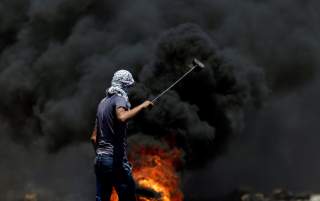Morgenthau's Realism and Today's Middle East
America can find a middle ground in the Middle East.
Critics of engagement with Iran argue that Rouhani’s ascension is meaningless since real power in the Islamic Republic lies in the hands of Supreme Leader Ayatollah Khamenei, who will prevent any alteration of Iran’s revolutionary Shia identity. But Khamenei and the Republican Guard cannot ignore the broad demands for change by the Iranian people and their growing political clout. Further, their legitimacy is derived from the perception that Iran is threatened by external actors, like the United States. If Washington removes threats to the Islamic Republic, it can create conditions that enable reformists like Rouhani to thrive and demand a status quo foreign policy.
Other advocates of Trump’s Middle East foreign policy argue that it reassures allies which were otherwise alienated under the Obama administration. But what is the use of guaranteeing U.S. commitments to Saudi Arabia, Egypt and Israel when it will only embolden them to take aggressive actions which undermine regional stability and U.S. interests? Instead, the United States should make clear that moderating their own policies while engaging Iran in exchange for a status quo posture will reduce their existential threats. And, if the Sunni states and Israel do accept a new regional order based on pluralism and coexistence, then the United States can offer them clear and unambiguous guarantees of military aid and security commitments.
The above discussion of how the United States might pursue a truly realist policy in the Middle East is not intended to simplify the overlapping rivalries in the region, nor the intricate complexities of the region’s conflicts. But it does illustrate how Morgenthau’s understanding of the balance of power can suggest a path to Middle East stability. It requires that the United States accept pluralism as the region’s overarching moral principle and share power with its leading states. If the Trump administration refuses to enact such policies, then its domestic opponents should offer this truly realist alternative.
Stephen Pampinella is assistant professor of Political Science and International Relations at the State University of New York (SUNY) at New Paltz. His current research focuses on state building interventions, imperialism, nationalism and a pluralist foundation for American foreign policy. Follow him on Twitter at @stevepampinella.
Image: A Palestinian protester uses a sling to hurl stones towards Israeli troops during clashes following a protest against the nearby Jewish settlement of Qadomem, in the West Bank village of Kofr Qadom near Nablus June 30, 2017. REUTERS/Mohamad Torokman

